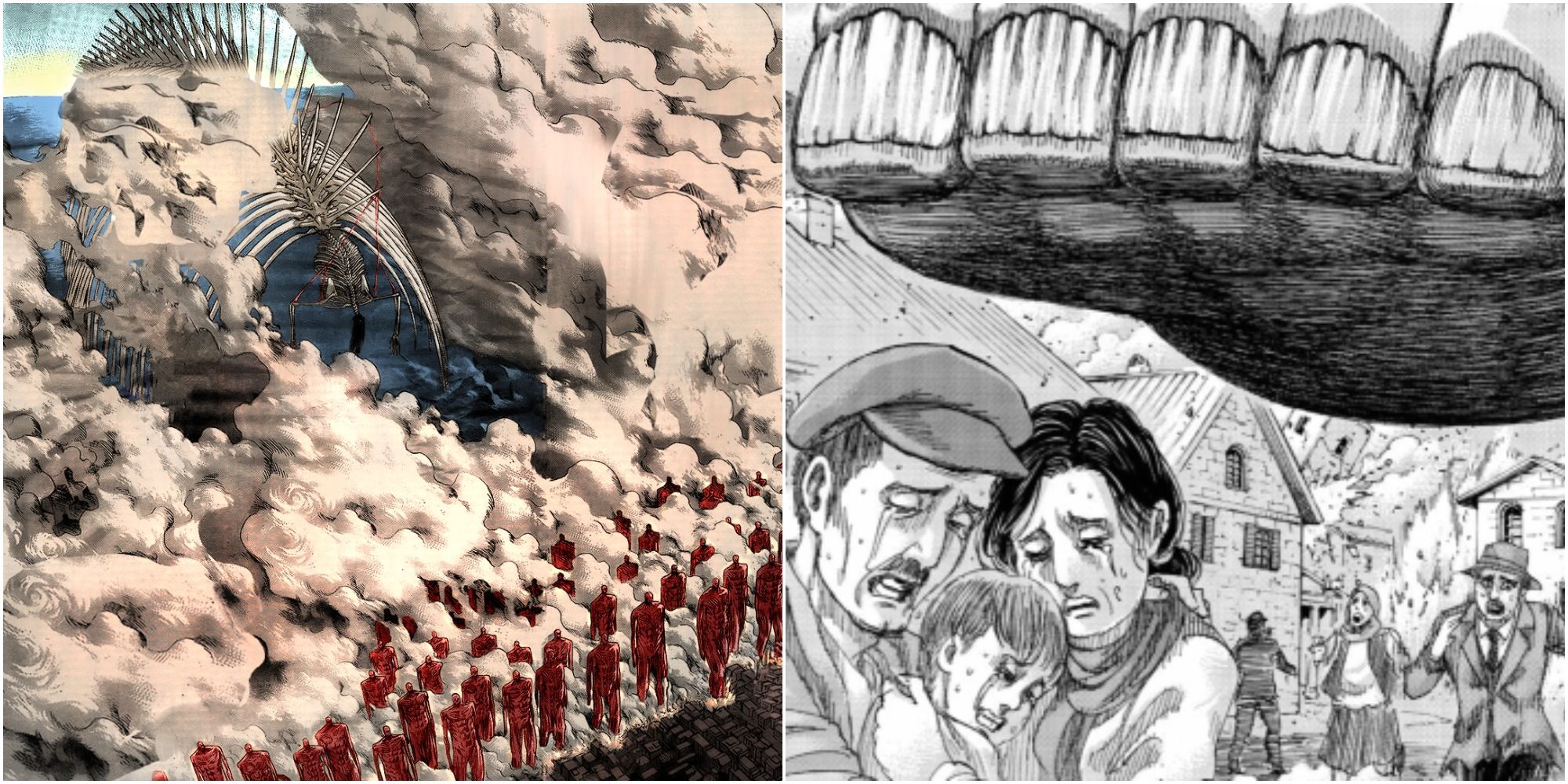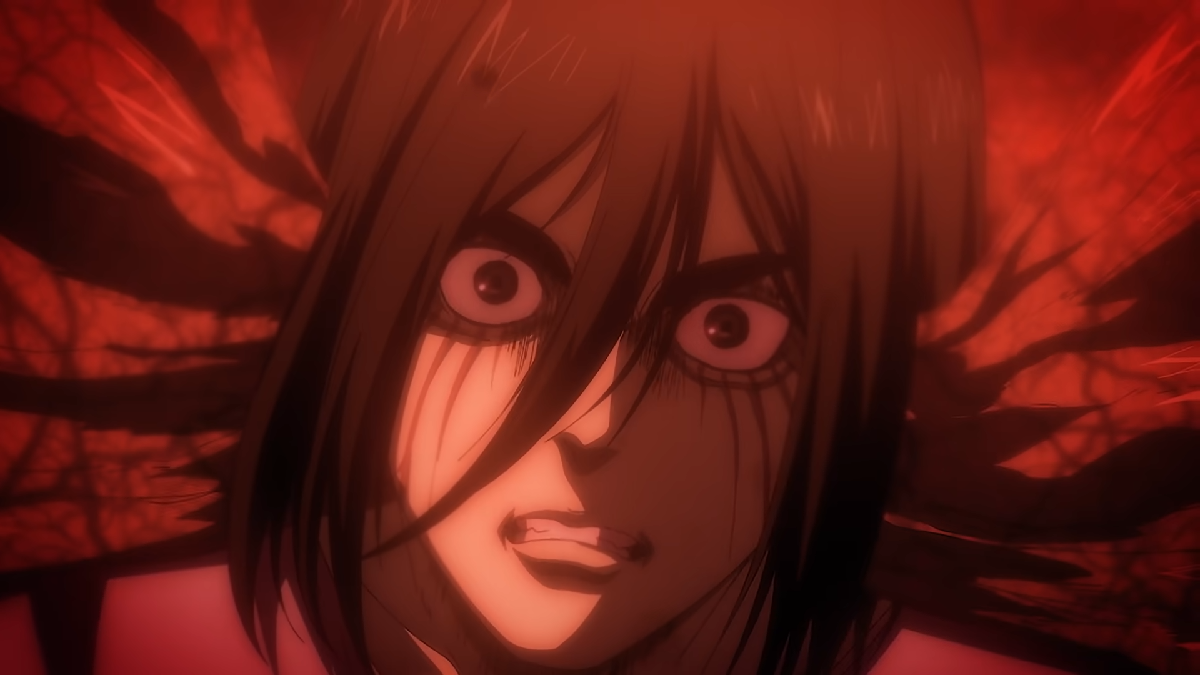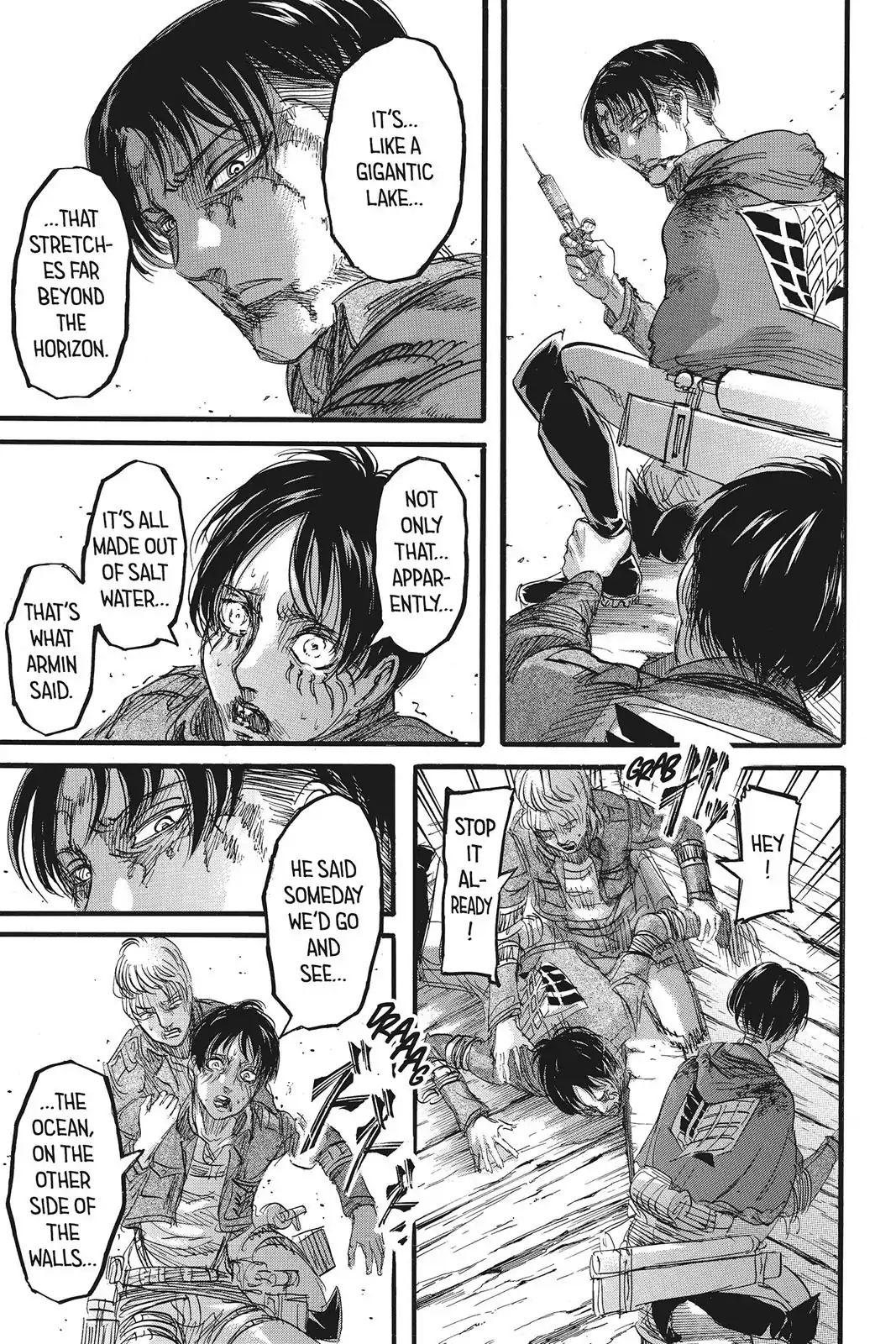In the vast and intricate world of Attack on Titan, Eren Yeager stands out as one of the most complex characters. His evolution from an idealistic young boy to a morally ambiguous figure illustrates a profound journey filled with pain, loss, and a quest for freedom. As fans, we watch Eren grapple with his motivations and choices, especially in light of a devastating event known as the Rumbling. This post delves into the intricacies of Eren's character development and the heavy burden of his regrets.
The Concept of the Rumbling in Attack on Titan

The Rumbling is a pivotal event in Attack on Titan, serving as a catalyst for Eren’s transformation and the series' climax. But what exactly does the Rumbling entail? At its core, it refers to the unleashing of the colossal titans hidden within the walls of Paradis Island, a devastating spectacle Eren decides to set in motion. Let’s break it down:
- Origins: The Rumbling emerges from the inherited powers of the Founding Titan, passed down through generations. Eren inherits these powers from his father, giving him the ability to control the titans and unleash their destructive potential.
- Purpose: Eren believes that the Rumbling serves a dual purpose: protecting his people from external threats and asserting their right to freedom. However, this goal masks a darker reality—wiping out humanity outside of Paradis.
- Execution: The decision to initiate the Rumbling is not made lightly; it reflects Eren’s shift from a hopeful hero to a complex antagonist. The act itself is a stark declaration of war, showcasing extreme measures taken in the name of survival.
- Consequences: The aftermath of the Rumbling is catastrophic. Millions of lives are lost, leaving behind a landscape of ruin and despair. Eren grapples with the morality of his actions, leading to profound moments of introspection.
Through the Rumbling, we see Eren's character deepening with layers of regret as he confronts the true implications of his choices. What began as a fight for freedom morphs into a discussion about the price of that freedom—a core theme that resonates throughout the series.
As viewers, we are left to ponder not just the actions of Eren Yeager but the very nature of humanity itself. Is the eradication of an entire race justified in the name of protecting one’s own? Eren's journey offers no clear answers, leaving a lasting impact on the audience and challenging our moral beliefs.
In the end, the Rumbling isn’t just a plot device; it symbolizes the weight of Eren's choices and the intricate web of consequences that follow. It’s a turning point that highlights the complexities of his character, encapsulating his struggles with guilt, regret, and the haunting realization of what it truly means to fight for freedom.
Also Read This: How Are Royal Rumbles Planned? Behind the Scenes of WWE’s Most Iconic Match
3. Eren's Motivation Behind Initiating the Rumbling

When we think about Eren Yeager and his decision to unleash the Rumbling, it’s essential to understand the complex web of motivations that drove him to such a drastic action. Initially, Eren's motivations can be traced back to his desire for freedom. Living in a world that has been dominated by walls and oppression, he became increasingly frustrated with the limitations placed on his people. This desire for freedom becomes so intense that it transforms into a desperate need to eliminate what he sees as the roots of their suffering.
But what does freedom mean to Eren? To him, it morphs into a vision where his people can live without fear of annihilation. Eren believes that if he has to bear the weight of such destruction to achieve peace and safety for his friends and family, then it’s a price worth paying. This mindset reveals an important aspect of Eren's character: his willingness to sacrifice not just for his people, but also for his ideals.
Furthermore, Eren's move towards the Rumbling can also be seen through the lens of desperation. After witnessing countless battles and the loss of comrades, Eren feels cornered. Each conflict erodes his faith in diplomacy, making him increasingly determined that he must take extreme measures to ensure the survival of the Eldians. This perspective is shot through with a sense of hopelessness—a realization that traditional means of defense or negotiation have failed miserably. Hence, Eren's decision resonates with themes of survival, sacrifice, and the eternal struggle against antagonism.
To summarize Eren’s motivations, we can highlight a few key points:
- Desire for Freedom: Eren yearns for a world where his people can live free from oppressive threats.
- Protection of Loved Ones: With an unyielding drive, he is willing to do anything to protect his friends and family, leading him to justify the devastating consequences of the Rumbling.
- Desperation: Eren feels that all other options have been exhausted, compelling him towards violent solutions.
- Hopelessness in Diplomacy: Eren's experiences lead him to believe that negotiation is futile, shaping his extreme viewpoint.
Eren’s motivations provide a deep insight into a character who grapples with moral ambiguities and complicated circumstances. His choice encapsulates the internal conflict faced by many characters within the series, deftly inviting viewers to question the morality of such extreme actions in the quest for peace.
Also Read This: What Is Instagram Super Rumble
4. Key Moments That Indicate Eren's Regret

As we dissect Eren's character arc, one of the most compelling elements is his burgeoning regret over the choices he makes during the Rumbling. While it might be tempting to label him a villain, several pivotal moments reveal his internal struggle and emotional turmoil. These instances serve as critical markers in Eren's development, forcing both him and the audience to confront the weight of his decisions.
One of the most striking moments occurs in the lead-up to Eren's awakening of the Rumbling. In conversations with Mikasa and Armin, we can see a flicker of doubt in Eren’s eyes—a palpable struggle between his ambition and the love he holds for his friends. Whenever Eren grapples with the enormity of what he's about to enact, his expressions hint at an inner conflict: he is torn between the drive to push forward and the lingering memories of camaraderie and connection that he will inevitably sacrifice.
Another dramatic turn comes during the confrontation with former allies in Marley. As he faces off against familiar faces, we catch glimpses of hesitation and sadness in his actions. Eren has spent a significant part of his life fighting side by side with these characters, and now they find themselves on opposite sides of an ideological chasm. The fleeting moments of connection—an unguarded smile, a lingering look—paint a poignant picture of Eren’s regret for having pushed the world into conflict.
Similarly, during the climactic battles, Eren's physical actions often juxtapose with the emotional weight of his decisions. For instance, scenes where he pauses mid-fight, reflecting on past friendships and experiences, drive home the pain he feels. He is no longer just the determined hero; he has morphed into a tragic figure who recognizes the cost of his actions.
To sum up the moments that illustrate Eren's regret:
- Conversations with Mikasa and Armin: These discussions holographically represent Eren's inner struggle—his dreams versus the bonds he will sever.
- Confrontations with Allies: Seeing former friends as enemies forces him to reflect on what he has lost in pursuit of his goals.
- Moral Dilemmas during Battles: Acknowledging the emotional toll of his decisions amidst conflict showcases Eren's burgeoning self-awareness.
Through these moments, Eren Yeager transforms from a character defined solely by his passion into a deeply nuanced figure, embodying the complexities of regret and the moral weight of his choices. It’s this tragedy that resonates with audiences, prompting us to reflect on the true cost of ambition and the fragile threads of human connection.
Also Read This: Why Is Rumble Gaining Popularity Among Independent Filmmakers?
5. Character Development: From Hero to Antagonist
When we first meet Eren Yeager in Attack on Titan, he's the quintessential hero: a passionate young boy fueled by a desire for freedom and justice. We watch him evolve from a hopeful child dreaming of adventure to a soldier fighting for humanity's survival. But as the story progresses, we witness a profound transformation that shifts his role from a hero to an antagonist, challenging our perceptions of what it means to be a hero in the first place.
In the earlier seasons, Eren's motivations are clear and noble. He wants to eradicate the Titans and protect his friends and family from the horrors that plague them. His journey is one of bravery, sacrifice, and a deep sense of morality. However, as we delve deeper into the lore and complexity of the world, Eren begins to grapple with darker themes, leading to a pivotal moment where he makes the fateful decision to initiate the Rumbling.
This transition from hero to antagonist is not just a plot twist; it's a profound commentary on the weight of choice and consequence. Eren's character development forces audiences to question whether ends justify the means. His willingness to unleash destruction, even on those who once stood by him, portrays a man burdened by a sense of inevitability and desperation. It's as if the very freedom he craved has driven him to the brink of tyranny.
The layers of his character become evident when we see him driven not just by anger, but also by a deep internal conflict. The destruction he brings isn't celebrated; it's met with horror, showcasing the tragic heavy price of his decisions. His transformation illustrates a complex duality where heroic ideals are now clouded by the realities of war, survival, and moral ambiguity.
By the conclusion, Eren is no longer a straightforward hero. He embodies the gray areas of morality, a character whose motivations are as complex as the themes of humanity itself. His choices spark discussions about free will, destiny, and the dark paths that ambition can lead us down. Ultimately, Eren's journey serves as a cautionary tale about the consequences of extreme ideology and the futility of violence.
Also Read This: Why Is My Anus Rumbling? Understanding Common Digestive Issues
6. The Impact of Eren's Choices on His Relationships
One of the most poignant aspects of Eren's character arc is its ripple effect on his relationships with those around him. As Eren shifts from a beloved protagonist to a harbinger of destruction, the fallout influences the dynamics with his closest friends and allies. These transformations reveal themes of betrayal, loyalty, and the heartbreaking nature of human connections.
Consider his relationship with Mikasa. Throughout the series, Mikasa has been fiercely dedicated to Eren, demonstrating unwavering loyalty even when faced with tremendous challenges. However, as Eren embraces his role in the Rumbling, their bond becomes strained. Mikasa's unreciprocated feelings and her struggle to reconcile her love for Eren with the horror of his choices create a heartbreaking narrative thread. It poses a vital question: Can love endure in the face of fundamentally opposing ideals?
Then there’s Armin, Eren's childhood friend and moral compass. Their relationship demonstrates the most significant impact of Eren's choices. Armin yearns for freedom and peace but grapples with the bloodshed that Eren endorses. We see the painful conflict between their longstanding friendship and the stark reality that Eren's actions jeopardize their shared dreams. Armin's eventual confrontation with Eren is laced with sorrow and desperation, highlighting how Eren's decisions have forced him into a role of adversary rather than ally.
- Complexity of Friendship: Eren's choices pit friends against each other, raising questions about loyalty and moral accountability.
- Familial Bonds: His relationship with his family, especially with Gabi and Zeke, showcases personal stakes and emotional turmoil.
- Ideological Divides: Eren’s drastic choices create ideological rifts, emphasizing how personal relationships can fracture under the weight of belief systems.
In essence, Eren's choices not only transform his character but also reverberate throughout the world and relationships he once cherished. The impact of the Rumbling redefines these connections, forcing characters to confront their values and the meaningfulness of their ties. Ultimately, Eren’s descent into isolation serves as a powerful reminder of how ambition and fear can distort even the most profound friendships.
Also Read This: How Long Was the Rumbling in Attack on Titan? A Timeline of Events
7. Fan Reactions and Theories about Eren's Regret
When it comes to the complex character of Eren Yeager in Attack on Titan, fans have been vocal about their reactions to his profound regret following the Rumbling. This pivotal moment in the series has sparked a myriad of discussions, theories, and emotional responses that highlight the multifaceted nature of Eren's character. Let's dive into some of the key fan reactions and theories.
Many fans initially struggled to reconcile the Eren they knew, who was driven by a fierce desire for freedom, with the one who ultimately chose a path of destruction. Some viewers expressed anger and disappointment, feeling betrayed by Eren's drastic choices. They argued that he contradicted the very ideals he fought for throughout much of the series. Others, however, took a more empathetic stance, suggesting that his decisions were clouded by the immense weight of his responsibilities and traumatic experiences.
One popular theory that has arisen is that Eren's regret serves as a catalyst for his ultimate redemption. Fans speculate that this emotional turmoil might lead Eren to actions that could redeem his character, potentially setting up a dramatic final confrontation where he recognizes the human cost of his choices. This idea aligns with the show's overarching themes of morality and redemption.
- The Regret as Motivation: Some theorize that Eren’s regret may drive him to seek a path that reconciles his actions—perhaps by looking for ways to save those he has harmed.
- The Influence of Time Travel: Considering the timeline complexities introduced throughout the series, many fans suggest that Eren's ability to see into the future might complicate his feelings of regret. Could he have foreseen the consequences of the Rumbling?
- Connection to Historia: A faction of fans has noted the connection between Eren’s choices and Historia’s role, arguing that Eren's regret can be tied to his desire to protect those he cares about, including Historia.
Social media platforms and forums have been abuzz with fan art, fanfiction, and long-form analyses dissecting his actions, portraying a deep investment in Eren's psychological state. These explorations have helped shape a wider understanding of his complex motivations, exposing the intricacies of his journey—from a boy seeking vengeance to a leader facing the consequences of his choices.
8. Conclusion: What Eren's Regret Means for Attack on Titan's Legacy
Eren Yeager's journey throughout Attack on Titan is a testament to the series' ability to tackle complex themes of morality, freedom, and the cost of power. His regret over the Rumbling is not just a plot development; it is a pivotal moment that shapes the legacy of the story. It serves as a narrative device that forces both characters and viewers to confront the heavy implications of their choices.
In the grand scheme of the series, Eren's regret enhances the tragic elements of his character. It underscores the idea that even those with the noblest of intentions can fall prey to the darker sides of human nature. This resonates deeply with audiences, reminding us that every action has consequences, and the quest for freedom can sometimes lead down a dark path.
Moreover, Eren's arc invites viewers to examine their ideas of heroism and villainy. Can one truly be labeled as a hero when their actions bring about suffering? This ambiguity is what makes Attack on Titan a powerful narrative; it pushes the boundaries of traditional storytelling and encourages viewers to reflect on the gray areas of morality.
Ultimately, Eren Yeager’s regret will likely leave an indelible mark on fans and the world of anime as a whole. As discussions around his character continue, it’s clear that his legacy will spark conversations for years to come, making Attack on Titan not just a story about giants and battles, but a profound exploration of what it means to be human.
 admin
admin








